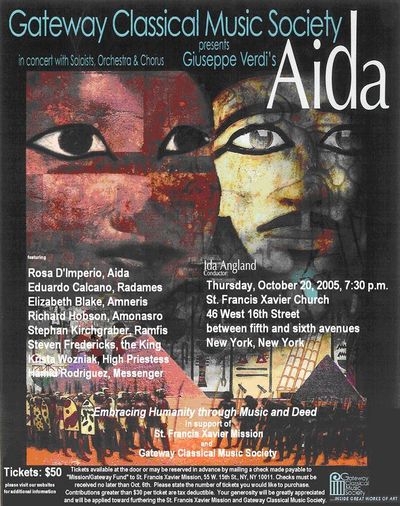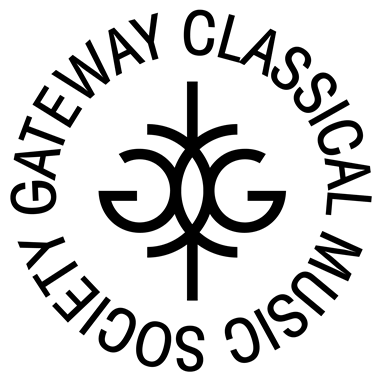Gateway Classical Music Society,
Gateway Classical Music Society of New York and the New York Grand Opera are 501(c)(3) not-for-profit corporations.
All contributions are tax deductible as allowable by law.

NY City Debut Aida Review Nov 2005
The Italian Voice ~ November 15, 2005
New York City DebutGuiseppe Verdi's AidaPerformance October 20, 2005
Return to Archives
New York City Debut
Guiseppe Verdi's Aida
Performance October 20, 2005
This review was printed in The Italian Voice and in OPERA-L , an internet website
GATEWAY CLASSICAL MUSIC SOCIETY PRESENTS VERDI'S "AIDA"
A Review by Nino Pantano
The magnificent dome and statuary of St. Francis Xavier Church on West 16th Street served as the setting for ancient Egypt for this special performance of Aida. It was a joint effort of the Gateway Classical Music Society and the St. Francis Xavier Mission whose outreach includes food and lodging for the homeless and adult education programs among other humanitarian endeavors. This fusing of Verdi and philanthropy is not an odd coupling. The great composer and his wife Giuseppina, according to Verdi biographer Mary Jane Phillips Matz, contributed greatly to children's hospitals and other charities. Verdi s greatest masterpiece, the composer felt, was the Casa Di Riposo for aged and indigent singers and musicians where he and Giuseppina are buried and which still exists today. It is in this spirit of helping humanity that conductor Ida Angland and her Gateway Classical Music Society came to New York from Greenwich, Connecticut where their inaugural Aida and Carmen met with acclaim. There was a large diverse audience that cheered and appreciated this performance.
The evening of Thursday, October 20 was a true merging of “Embracing Humanity through Music and Deed” which serves as a theme of The Gateway Classical Music Society. Giuseppe Verdi would have been proud not only for the humanitarian aspect but especially for the quality of the performance.
In the title role, Rosa D'Imperio was one of the best Aida's in memory. Her lovely soprano could soar thrillingly and float exquisitely and her artistic temperament was right on the mark. “Ritorna Vincitor” was indicative of the high quality of her art and her “O patria Mia” had some exquisite pianissimi. In the various duets and ensembles she proved herself an artist supreme. Hers is a career to watch.
As Aida's love and Amneris' fiancée, Eduardo Calcano used his tenor with intelligence and discretion. Calcano's musicality allowed him to conquer the hurdles of Radames with comparative ease. Calcano's instrument is a more lyric than dramatic but like Carlo Bergonzi, he knows how to sing. His “Celeste Aida” was well done and he was especially forceful in the act three “Nel Fiero anelito di nuove Guerra.” In the final act “O terra Addio,” Calcano and D'Imperio proved a golden age blend.
Many think the true title should be Amneris rather than Aida because of the great dramatic role of Amneris who opens up a literal Pandora's Box with her jealous rivalry with Aida the enemy slave daughter of the rival king Amonasro.
Elizabeth Blake was a superb Amneris her rich mezzo plumbing the depths and soaring the heights that this dramatic role requires. From her confrontation scenes with Aida and Radames, her voice and emotion were riveting and her Act 4 “A tu de Vivere” had the audience in a frenzy. There is no “break” in her register and her mezzo madness was negotiated smoothly from top to bottom. To hear such an Aida D'Imperio and an Amneris (Blake) is to hear and see operatic rivalry at its best.
In the part of Amonasro the king of Ethiopia and father of Aida Metropolitan Opera's Richard Hobson gave a thrilling dynamic performance in a role very congenial to his rich soaring beautiful baritone. Hobson's leading the slaves in ensemble “Ma tu re fu Signore Possente” evoked memories of the great American baritone Leonard Warren. Hobson's angry rage at Aida's refusal to betray Radames in the third act's “Nel fiero Anelito di nova Guerra” was bone chilling in its fury and vocal deportment.
In the role of Ramfis the high priest Stephan Kirchgraber evoked memories of the golden age basso Ezio Pinza who was the great Ramfis at the Metropolitan Opera. In the great temple of Vulcan scene with Radames, his rich sonorous basso was a perfect match for Radames (Calcano) Kirchgraber has an imposing physical presence to match and his voice also excites in its upper reaches.
The king of Egypt was well served by the majestic bass baritone of Stephen Fredricks whose dark baritone gave special impact to this regal and authoritative part.
Krista Wozniak's shimmering soprano added just the right touch as the High Priestess making one want to hear more and Hamid Rodriguez displayed a fine tenor with a heroic edge in his brief part as the messenger.
The Gateway chorus was absolutely superb and fresh voiced. They negotiated the soaring passages with aplomb and the softer passage s with loveliness. Much of the music in Aida is a foretaste to Verdi's mighty Requiem to come three years later.
And last is best. Ida Angland, the conductor, has sound musical instincts. Without hesitation, she goes out in the storm and triumphs. There is a gamble in risking such a mighty undertaking as Aida and bringing it to the people. Ms Anglund is a glamorous presence, but more importantly she has idealism and grit which she takes with her to the podium. This was an Aida conducted in the spirit of her mentor The New York Grand Opera's Maestro Vincent LaSelva, but also the spirits of Toscanini, Stokowski, Sarah Caldwell, Bruno Walter and all the legendary pioneers and conductors. Ms. Angland has great flair but her perfect control was also an inspiration. From the opening bars to the soaring passages of The Grand March, (always a show stopper) to the silence of the tomb finale, the superb Gateway Orchestra and Chorus sang as one breath. The audience heard nuances and colors in the score that were a revelation. Even veteran opera goers saw this Aida in a new light. This was an unforgettable experience and we all welcome this new and amazing company to New York City. The audience responded with a standing ovation and many bravos. The music, I believe, is somewhere absorbed in the statues of the saints and the dome of the church and in the hearts and minds of all who were privileged and blessed to attend.
Nino Pantano
Brooklyn, NY 11231
* * * * * * * * * * * * * * * * * * * * * * * * * * * * * * * * * * * * * * *
For help on commands, files, pictures, etc., visit the homepage:
http://www.OPERA-L.org
Gateway Classical Music Society,
Gateway Classical Music Society of New York
and the New York Grand Opera
are 501(c)(3) not-for-profit corporations.
All contributions are tax deductible as allowable by law.

